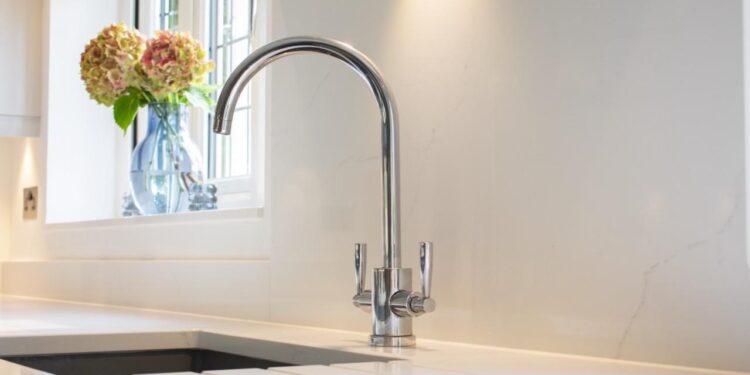
Quartz is a durable, non-porous material commonly used in worktops and other surfaces. It is an engineered stone made from natural quartz crystals combined with resins and polymers, resulting in a hard, scratch-resistant surface. Known for its low maintenance requirements, quartz does not require sealing unlike most natural stones, and is resistant to stains, bacteria, and mould. It comes in various colours and patterns and can mimic natural stones such as marble or granite, offering complete design flexibility. Quartz worktops have become increasingly popular among homeowners in the last few years, so we're asking the question: is engineered stone the way forward?
Engineered stone is a man-made material containing natural stone particles mixed with resins and pigments. This combination is compressed and heated to create a durable, non-porous surface that mimics the look of natural stone while offering superior resistance to stains, scratches and moisture. Unlike natural stone, it can provide a consistent appearance, to create more cohesive designs in your space.
Key Characteristics of Quartz Surfaces:
One of the leading factors in the surge of quartz's popularity is it's durability, low maintenance, and aesthetic appeal. As a worktop, it offers a variety of practical benefits that make it an ideal choice for kitchens and bathrooms. Let's dive a bit deeper into the key characteristics of this superstar stone:
- Durability – Quartz worktops are resistant to scratches, chips, and cracks because of their engineered composition and are much less prone to wear and tear compared to softer natural stones. This is a stone that is perfect for high-traffic areas in your home.
- Non-Porous Surface – Quartz is a non-porous substance, meaning it doesn't absorb liquids or stains. This makes it resistant to water damage, mould, and bacteria growth, contributing to a more hygienic surface.
- Low Maintenance – A simple wipe with mild soap and water is typically enough to keep the surface looking pristine, and unlike natural stone worktops, they do not require regular sealing.
- Scratch Resistant – Quartz mineral ranks 7 on the Mohs scale of hardness, creating a highly scratch-resistant surface for worktops. It is still advised to use cutting boards and to not cut directly on the surface, to prevent the dulling of knives and ensure long-term protection of your space.
- Aesthetic Versatility – It can come in a wide range of colours, patterns, and finishes, providing both modern and classic options. With quartz, there is an option to suit any aesthetic preference and it allows you to show off your personality in the design of your home.
- Consistency in Appearance – Unlike natural stones, quartz offers a consistent appearance across large slabs. There are no irregularities or colour variations, making it an ideal choice for those seeking a smooth modern finish without unexpected variations.
- Cost – Quartz worktops generally cost less than high-end natural stones like granite or marble
The Potential Drawbacks of Quartz Worktops:
While quartz worktops certainly offer many benefits, there are a few potential drawbacks to consider before committing to the decision.
- Although quartz does have a moderate resistance to heat, it remains important to avoid placing hot objects directly onto the surface, as this can cause discolouration or thermal shock. Using trivets or heat pads is always recommended.
- Quartz can also be sensitive to prolonged exposure to direct sunlight, which may cause fading, meaning it is not suited for outdoor use.
- It can be a more expensive option than some other choices such as wood or laminate
These drawbacks are factors that you would need to think about when deciding on a quartz worktop for your home, however, the positive characteristics of the stone, and the cost compared to its natural stone counterparts, arguably outweigh these worries for most prospective buyers.

The Environmental Impact of Engineered Stone:
Overall, engineered stone is generally more sustainable than traditional natural stone. The production process uses a combination of natural quartz and recycled materials, reducing the need for extensive quarrying.
Quartz worktops are also highly durable, meaning they last longer once they are in your home, reducing the need for frequent replacements or repairs. This therefore minimises waste over time.
A large number of manufacturers are now trying to incorporate eco-friendly practices, such as energy-efficient processes and water recycling, however, the production of engineered stone does and will always consume a certain amount of energy and resources.
Is Engineered Stone the Future of Modern Kitchens?
Engineered stone, offers a compelling blend of durability, low maintenance, and aesthetic versatility, making it a strong contender as the future of kitchen design, and its long-lasting quality and ease of care provide excellent long-term value. Its ability to mimic the beauty of natural stone while offering superior resistance to stains, scratches, and bacteria makes it highly practical for high-traffic environments while maintaining a certain level of design capability. As consumer demand shifts towards stylish, functional, and eco-friendly options, engineered stone is poised to continue its rise as a top choice for kitchen surfaces.
Media Info:
Organization: henderstone
Email: info@henderstone.co.uk
Website: https://www.henderstone.co.uk/
The post Engineered Elegance – Why Quartz Worktops Are Taking Over Modern Kitchens? appeared first on New York Tech Media.
© 2024 Benzinga.com. Benzinga does not provide investment advice. All rights reserved.
Comments
Trade confidently with insights and alerts from analyst ratings, free reports and breaking news that affects the stocks you care about.